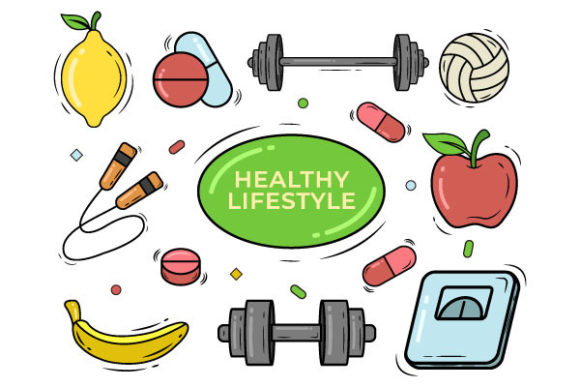With fast food, long work hours, and constant distractions becoming a part of everyday life, maintaining a healthy lifestyle can often feel like a challenge. However, making small adjustments to your habits can greatly enhance your physical and mental well-being. Whether you’re aiming to boost your energy, improve your mood, or live a longer, more vibrant life, adopting a healthy lifestyle is the key.
Living healthily isn’t just about eating well or working out; it’s about making intentional choices that support your body and mind. This includes balanced nutrition, regular exercise, effective stress management, and sufficient sleep. Every positive change you make, no matter how small, contributes to a healthier, more fulfilling life.
In this article, we’ll break down what a healthy lifestyle truly means, the benefits it brings, and practical steps you can take to integrate these habits into your daily routine. By making these changes, you’ll be on the path to a happier and healthier future.
What Is a Healthy Lifestyle ?

A healthy lifestyle goes beyond just eating nutritious foods or exercising at the gym. It’s about taking a holistic approach to your overall well-being. This includes being mindful of what you consume, how often you move, and how you manage stress in daily life.
In addition to physical health, a healthy lifestyle involves nurturing positive relationships and maintaining a healthy work-life balance. These factors play a significant role in your emotional well-being, reducing stress and improving your overall quality of life.
Mental health is also a crucial component of a healthy lifestyle. Taking the time to prioritize your emotional needs, practice self-care, and seek support when necessary can help you maintain mental clarity and emotional resilience.
At its core, a healthy lifestyle is a commitment to making consistent, sustainable choices that enhance both your physical and emotional health. Through these manageable changes, you can achieve greater energy, longevity, and a more fulfilling, balanced life.
The Key Pillars of a Healthy Lifestyle
Balanced Nutrition: Fueling Your Body the Right Way
A healthy diet is one of the most important pillars of a balanced healthy lifestyle. The foods you choose to eat provide the energy needed for daily activities while also supporting your immune system, helping you maintain a healthy weight, and positively influencing both your mood and mental clarity. While everyone’s nutritional needs are unique, there are some general guidelines that can benefit most people in achieving a well-rounded, nourishing diet. These principles can help ensure that you’re giving your body the right nutrients it needs to function at its best.
Eat More Whole Foods: Focus on nutrient-dense foods like fruits, vegetables, whole grains, lean proteins, and healthy fats. These foods are rich in vitamins, minerals, and antioxidants that promote good health.
Hydrate Properly: Drinking enough water is essential for digestion, skin health, and energy levels. Aim for at least 8 cups of water a day, or more if you’re physically active.
Limit Processed Foods: Highly processed foods, such as sugary snacks, fast food, and sugary drinks, can lead to weight gain, increased risk of chronic diseases, and energy crashes.
Portion Control: Eating mindfully and paying attention to portion sizes can prevent overeating. Consider using smaller plates or taking time to savor each bite.
Balance Macronutrients: Ensure your diet includes a good balance of carbohydrates, proteins, and fats to keep energy levels stable throughout the day.
Regular Physical Activity: Move Your Body for Better Health
Exercise is another cornerstone of a healthy lifestyle. Regular physical activity is crucial for cardiovascular health, muscle strength, flexibility, and overall wellness. It’s also a powerful tool for reducing stress and boosting mental health.
Find an Exercise You Enjoy: The best exercise is one you love, whether it’s running, yoga, swimming, cycling, or dancing. The more fun it is, the more likely you’ll stick with it.
Aim for Consistency: Consistency is more important than intensity. Aim for at least 150 minutes of moderate-intensity aerobic activity per week, plus muscle-strengthening exercises two or more days a week.
Incorporate Strength Training: Muscle mass naturally decreases as we age, but strength training can help you maintain or even increase muscle mass. This improves metabolism and prevents age-related health issues.
Prioritize Flexibility and Balance: Don’t neglect stretching or flexibility exercises. Yoga, Pilates, or even simple stretches can improve flexibility, posture, and balance—important for injury prevention.
Mental Well-Being: Cultivating Emotional Resilience
Mental health is just as important as physical health. A healthy lifestyle includes adopting habits that help manage stress, improve focus, and promote emotional resilience.
Practice Mindfulness and Meditation: Incorporating mindfulness practices, such as deep breathing, meditation, or journaling, can reduce stress and help you stay grounded.
Get Enough Sleep: Sleep is vital for mental and physical recovery. Aim for 7–9 hours of quality sleep each night. Poor sleep is linked to various health problems, including depression, weight gain, and impaired cognitive function.
Nurture Relationships: Healthy relationships with friends, family, and even colleagues have a significant impact on mental health. Spend time with people who uplift and support you.
Set Boundaries: Learning to say no, setting personal boundaries, and managing your time wisely can prevent burnout and help you maintain a healthy mental state.
Stress Management: Finding Calm in Chaos
In today’s fast-paced world, stress can often feel like a constant companion. However, chronic stress can have severe physical and emotional consequences, including higher risk of heart disease, weight gain, and anxiety.
Engage in Stress-Relieving Activities: Find activities that help you unwind, such as reading, taking walks, practicing yoga, or listening to music.
Prioritize Self-Care: Self-care doesn’t mean indulging in luxuries; it’s about making time for yourself. Whether it’s a hot bath, a walk in nature, or even an hour of silence, self-care helps you recharge.
Learn Relaxation Techniques: Deep breathing, progressive muscle relaxation, and guided visualization are effective tools to activate your body’s relaxation response.
Regular Health Check-Ups: Preventative Care Matters
Taking proactive steps to monitor and maintain your health is a key element of a healthy lifestyle. Regular check-ups and screenings can catch potential health issues before they become serious problems.
Annual Physical Exams: Even if you feel fine, routine exams can help detect underlying health conditions like high blood pressure, cholesterol, and diabetes.
Monitor Mental Health: Mental health screenings, such as therapy or self-assessment tools, can help you manage stress and prevent mental health issues from escalating.
Vaccinations and Preventative Care: Stay up-to-date with recommended vaccines and screenings, as these can prevent illnesses from spreading or worsening.
Benefits of a Healthy Lifestyle

Embracing a healthy lifestyle has far-reaching benefits that extend beyond just the physical realm. Here are some of the most significant advantages of adopting these habits:
Increased Life Expectancy
Living a healthy lifestyle can add years to your life. Studies have shown that individuals who adopt healthy habits—such as eating nutritious food, exercising regularly, and avoiding smoking—tend to live longer, healthier lives.
Enhanced Mental Clarity and Focus
Good nutrition, regular physical activity, and proper sleep have been shown to improve cognitive function, memory, and overall mental clarity. A healthy body promotes a sharp mind.
Better Mood and Emotional Stability
Exercise releases endorphins, which are the body’s natural mood boosters. When you exercise, you can experience improved mood, reduced anxiety, and a greater sense of well-being.
Reduced Risk of Chronic Diseases
A healthy lifestyle lowers the risk of developing many chronic conditions, including heart disease, diabetes, and cancer. By maintaining a healthy weight, eating nutrient-rich foods, and staying active, you can drastically reduce your risk.
Increased Energy Levels
A balanced diet, regular exercise, and proper rest can all help you feel more energized. You’ll find that with fewer energy slumps throughout the day, you’re more productive, focused, and ready to take on challenges.
Improved Sleep Quality
A healthy lifestyle, particularly through regular exercise and stress management, improves sleep patterns. Good quality sleep leads to better mood, increased productivity, and improved overall health.
Overcoming Challenges in Adopting a Healthy Lifestyle
While the benefits of a healthy lifestyle are undeniable, making lasting changes can feel like an uphill battle. Here are some common challenges and how to overcome them:
Time Constraints: Many people struggle to find time for exercise or healthy meal preparation. However, making small changes, such as meal prepping on the weekends or incorporating short workouts during the week, can make a big difference.
Lack of Motivation : Staying motivated is key to long-term success. Set realistic goals, track your progress, and celebrate your small victories. Surround yourself with supportive people who can encourage you.
Social Pressures : It’s easy to fall into unhealthy habits when surrounded by people who don’t prioritize health. However, don’t be afraid to set boundaries or encourage others to join you in making healthier choices.
Old Habits Die Hard: Breaking old habits takes time and patience. Start with small changes and gradually build upon them. Make sure to be kind to yourself when setbacks occur, and don’t give up on your journey.
Final Thoughts: Small Changes, Big Results
Adopting a healthy lifestyle doesn’t mean making drastic changes all at once. Instead, it’s about taking small, manageable steps that gradually add up to significant improvements in your overall well-being. Whether you begin by incorporating more vegetables into your meals, going for a daily walk, or practicing mindfulness to reduce stress, each positive action you take will bring you closer to living a healthier, more fulfilling life.
It’s important to remember that the goal isn’t perfection—it’s progress. Every small step you take, no matter how minor it may seem, is a step toward a better version of yourself. Embrace the journey and be patient with yourself, understanding that lasting change takes time. Celebrate each victory, big or small, and use it as motivation to keep going.
Your health is your most valuable asset. By making mindful choices and investing in your well-being today, you’re setting yourself up for a brighter, healthier, and happier future. Every positive decision you make is an investment in the life you deserve.
FAQs
1. What does a healthy lifestyle consist of?
A healthy lifestyle is a balanced approach to well-being, including proper nutrition, regular physical activity, good sleep hygiene, effective stress management, and mental health care. It also involves building positive relationships, maintaining a work-life balance, and avoiding harmful habits like smoking or excessive alcohol consumption.
2. How can I start living a healthier lifestyle?
Start by making small changes that are manageable and sustainable. Begin with one aspect of health, such as eating more fruits and vegetables, drinking more water, or taking a short walk each day. Gradually build on these habits and integrate more wellness practices over time.
3. What should I eat for a healthy diet?
A balanced diet includes a variety of whole foods such as fruits, vegetables, whole grains, lean proteins (like fish, poultry, or plant-based options), and healthy fats (like nuts, seeds, and avocados). Limit processed foods, added sugars, and excessive salt. Hydrate by drinking plenty of water throughout the day.
4. How much exercise do I need to stay healthy?
The general recommendation is at least 150 minutes of moderate-intensity aerobic activity (like brisk walking or cycling) per week, along with muscle-strengthening exercises on two or more days. However, any movement is beneficial, and starting with even small amounts of activity can lead to big health benefits.
5. How can I manage stress in a healthy way?
Healthy stress management techniques include practicing mindfulness, meditation, deep breathing exercises, or engaging in activities like yoga or journaling. Additionally, maintaining a supportive social network and setting boundaries to avoid burnout can be crucial in managing stress levels.
6. How important is sleep for a healthy lifestyle?
Sleep is essential for physical and mental health. Aim for 7-9 hours of quality sleep per night. Proper sleep helps with recovery, boosts energy levels, improves cognitive function, and supports emotional well-being. Creating a bedtime routine and limiting screen time before bed can improve sleep quality.
7. Can I enjoy treats and still maintain a healthy lifestyle?
Yes, a healthy lifestyle is about balance, not restriction. It’s okay to enjoy treats in moderation. The key is not to overindulge and to ensure that most of your meals are nutritious. Healthy living is about consistency, so occasional indulgence won’t derail your progress.
8. How can I stay motivated to live a healthy lifestyle?
Set realistic and achievable goals, track your progress, and celebrate small successes along the way. Surround yourself with supportive people who encourage your healthy habits. Remember that it’s okay to have setbacks—what matters is getting back on track and continuing to prioritize your health.

